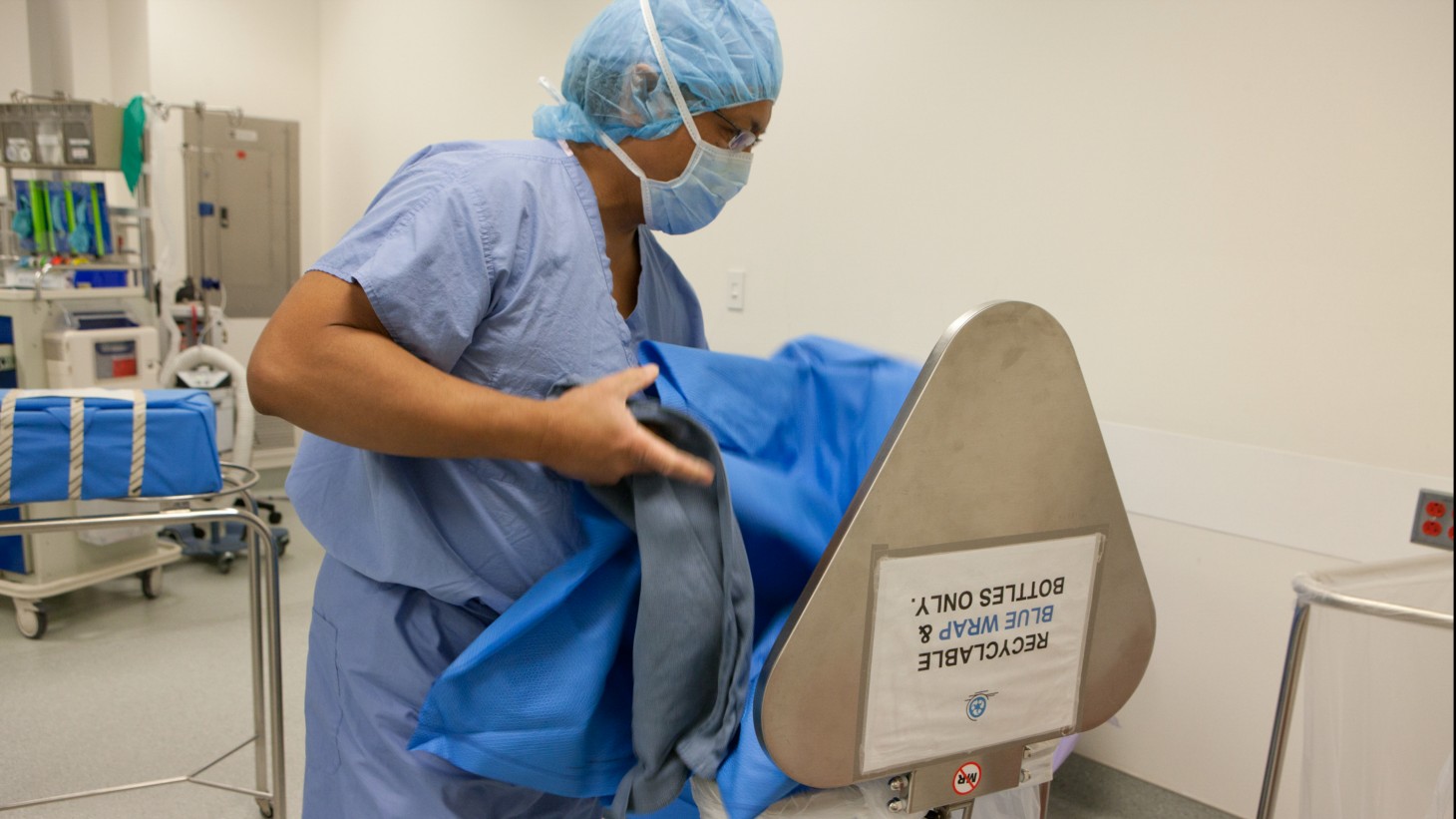
Blue wrap recycling in the operating room at the Sand Canyon Surgicenter
Project saves money and helps the environment--and assists local disabled adults, too
Looking for ways to make the Sand Canyon Surgicenter in Irvine more efficient, Albert Olmeda wound up learning a lot about blue wrap—like the fact that it makes up nearly 20 percent of the waste generated by hospital surgical services.
The lead Central Services technician and SEIU UHW member also learned that this heavily used hospital product, an industrial strength plastic used to maintain the sterility of medical and surgical instruments until opened, is not biodegradable and persists in the environment.
But recycled blue wrap can be sold as raw material for use in the production of other plastic products. Today, the surgicenter’s unit-based team has gone green with a blue wrap recycling project that is not only saving money and protecting the environment, but also aiding the community.
“The biggest problem with the blue wrap is when we throw it in the landfill, it’s there forever,” says Olmeda. “That’s a big concern especially considering how much blue wrap we use.”
How recycling works
About 600 pounds of blue wrap is collected every week from the center’s six operating rooms. It is picked up free of charge and sorted by Goodwill of Orange County, which sells it to a Houston recycling services company. The company reprocesses the plastic into beads that are used in various products, including railroad ties, pallets and artificial siding for decks, docks and houses.
The surgicenter has been recycling its blue wrap and plastic bottles since September 2009, reducing the facility’s solid waste disposal fee by 10 percent annually. The savings amount to a modest $5,880—but there’s a greater payoff. Proceeds from the sale of blue wrap and other recyclable products enable Goodwill to provide education and training programs for developmentally and physically disabled adults, including a state-of-the-art fitness center.
Peter Bares, business development manager for Goodwill of Orange County, says the relationship with Kaiser Permanente has gone beyond expectations. “It is kind of the perfect storm because of the nature of what we do and why we do it and the materials that the hospital generates,” he says.
Getting buy-in
As the frontline staff person responsible for the surgery center’s blue wrap disposal, Olmeda—and his fellow UBT members—championed the recycling cause, educating the staff at weekly in-services and UBT huddles. The team got the rest of the department on board by integrating the blue wrap recycling process without creating additional tasks.
“We figured if we changed workflows, staff wouldn’t want to do it.” says UBT co-lead Nicole Etchegoyen, a surgery scheduler and SEIU UHW steward. “But if we asked them, ‘How would this work best for you?’ then everyone would get involved, and they did.”
The team members designated a single container for blue wrap in each operating room. They also placed a larger bin for collecting multiple bags of discarded blue wrap near the soiled utility room, where the trash is taken on its way out of the surgery center.
“It’s not a big deal,” EVS worker and SEIU UHW member George Sollars said, hoisting bags. “We just carry it over here on our way out this door. It’s one of the easiest jobs. And it’s for a really good cause.”
No trash, just recycling
The hardest part was making make sure that other trash didn’t make it into the blue wrap recycling containers accidentally. Labeling the containers with signs reading ‘Recycling Blue Wrap Only’ helped, as did regular reminders by UBT members.
Now, everyone in the operating rooms—from doctors, nurses and surgical techs to nursing assistants and EVS workers—makes sure that the blue wrap containers aren’t contaminated with other trash, Etchegoyen says.
Olmeda does periodic spot checks. “Everybody who plays a role in the operating room has to look out to make sure no trash is going inside the containers,” he says. “It’s a team-building thing.”
“If it wasn’t for the UBT, this wouldn’t be happening,” said Ramin Zolfagar, MD, department head and UBT member. “We are helping the environment by ‘going blue,’ so to speak, and the end result is gym equipment for the disabled—which makes it all the more worthwhile.”
After learning about the project at a recent Orange County UBT fair, other departments are thinking about emulating it.
Visit the Goodwill of Orange County website to find out more about their work.
